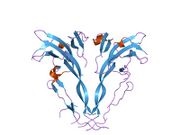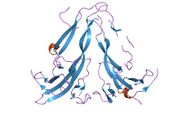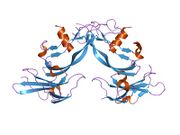Biology:ACVR2B
 Generic protein structure example |
Activin receptor type-2B is a protein that in humans is encoded by the ACVR2B gene.[1][2][3] ACVR2B is an activin type 2 receptor.
Function
Activins are dimeric growth and differentiation factors which belong to the transforming growth factor-beta (TGF-beta) superfamily of structurally related signaling proteins. Activins signal through a heteromeric complex of receptor serine kinases which include at least two type I (I and IB) and two type II (II and IIB) receptors. These receptors are all transmembrane proteins, composed of a ligand-binding extracellular domain with cysteine-rich region, a transmembrane domain, and a cytoplasmic domain with predicted serine/threonine specificity. Type I receptors are essential for signaling; and type II receptors are required for binding ligands and for expression of type I receptors. Type I and II receptors form a stable complex after ligand binding, resulting in phosphorylation of type I receptors by type II receptors. Type II receptors are considered to be constitutively active kinases. This gene encodes activin A type IIB receptor, which displays a 3- to 4-fold higher affinity for the ligand than activin A type II receptor.[3]
Interactions
ACVR2B has been shown to interact with ACVR1B[4][5] and SYNJ2BP.[6]
References
- ↑ "Expression of type II activin receptor genes during differentiation of human K562 cells and cDNA cloning of the human type IIB activin receptor". Blood 83 (8): 2163–70. May 1994. doi:10.1182/blood.V83.8.2163.2163. PMID 8161782.
- ↑ "Genomic organization and mapping of the human activin receptor type IIB (hActR-IIB) gene". J. Hum. Genet. 43 (2): 132–4. July 1998. doi:10.1007/s100380050054. PMID 9621519.
- ↑ 3.0 3.1 "Entrez Gene: ACVR2B activin A receptor, type IIB". https://www.ncbi.nlm.nih.gov/sites/entrez?Db=gene&Cmd=ShowDetailView&TermToSearch=93.
- ↑ "Activation of signalling by the activin receptor complex". Mol. Cell. Biol. 16 (3): 1066–73. March 1996. doi:10.1128/mcb.16.3.1066. PMID 8622651.
- ↑ "Truncated activin type II receptors inhibit bioactivity by the formation of heteromeric complexes with activin type I. receptors". Exp. Cell Res. 224 (2): 323–34. May 1996. doi:10.1006/excr.1996.0142. PMID 8612709.
- ↑ "Regulation of endocytosis of activin type II receptors by a novel PDZ protein through Ral/Ral-binding protein 1-dependent pathway". J. Biol. Chem. 277 (21): 19008–18. May 2002. doi:10.1074/jbc.M112472200. PMID 11882656.
External links
- Human ACVR2B genome location and ACVR2B gene details page in the UCSC Genome Browser.
- Overview of all the structural information available in the PDB for UniProt: Q13705 (Human Activin receptor type-2B) at the PDBe-KB.
- Overview of all the structural information available in the PDB for UniProt: P27040 (Mouse Activin receptor type-2B) at the PDBe-KB.
Further reading
- "Conserved and divergent mechanisms in left-right axis formation". Genes Dev. 14 (7): 763–76. 2000. doi:10.1101/gad.14.7.763. PMID 10766733.
- "Truncated activin type II receptors inhibit bioactivity by the formation of heteromeric complexes with activin type I. receptors". Exp. Cell Res. 224 (2): 323–34. 1996. doi:10.1006/excr.1996.0142. PMID 8612709.
- "Activation of signalling by the activin receptor complex". Mol. Cell. Biol. 16 (3): 1066–73. 1996. doi:10.1128/MCB.16.3.1066. PMID 8622651.
- "Identification of type I and type II serine/threonine kinase receptors for growth/differentiation factor-5". J. Biol. Chem. 271 (35): 21345–52. 1996. doi:10.1074/jbc.271.35.21345. PMID 8702914.
- "Inhibin interferes with activin signaling at the level of the activin receptor complex in Chinese hamster ovary cells". Endocrinology 138 (7): 2928–36. 1997. doi:10.1210/endo.138.7.5250. PMID 9202237.
- "Specific activation of Smad1 signaling pathways by the BMP7 type I receptor, ALK2". J. Biol. Chem. 273 (40): 25628–36. 1998. doi:10.1074/jbc.273.40.25628. PMID 9748228.
- "Left-right axis malformations associated with mutations in ACVR2B, the gene for human activin receptor type IIB". Am. J. Med. Genet. 82 (1): 70–6. 1999. doi:10.1002/(SICI)1096-8628(19990101)82:1<70::AID-AJMG14>3.0.CO;2-Y. PMID 9916847.
- "Determination of resonance frequency of the respiratory system in respiratory distress syndrome". Arch. Dis. Child. Fetal Neonatal Ed. 80 (3): F198-202. 1999. doi:10.1136/fn.80.3.F198. PMID 10212081.
- "Regulation of anterior/posterior patterning of the axial skeleton by growth/differentiation factor 11". Nat. Genet. 22 (3): 260–4. 1999. doi:10.1038/10320. PMID 10391213.
- "Assignment of ACVR2 and ACVR2B the human activin receptor type II and IIB genes to chromosome bands 2q22.2-->q23.3 and 3p22 and the human follistatin gene (FST) to chromosome 5q11.2 by FISH". Cytogenet. Cell Genet. 87 (3–4): 219–20. 1999. doi:10.1159/000015429. PMID 10702675.
- "Modulation of activin signal transduction by inhibin B and inhibin-binding protein (INhBP)". Mol. Endocrinol. 15 (4): 668–79. 2001. doi:10.1210/mend.15.4.0616. PMID 11266516.
- "Transforming growth factor-beta receptor-associated protein 1 is a Smad4 chaperone". J. Biol. Chem. 276 (22): 19495–502. 2001. doi:10.1074/jbc.M006473200. PMID 11278302.
- "Sorting nexin 6, a novel SNX, interacts with the transforming growth factor-beta family of receptor serine-threonine kinases". J. Biol. Chem. 276 (22): 19332–9. 2001. doi:10.1074/jbc.M100606200. PMID 11279102.
- "Differential expression of activin/inhibin subunit and activin receptor mRNAs in normal and neoplastic ovarian surface epithelium (OSE)". Mol. Cell. Endocrinol. 174 (1–2): 99–110. 2001. doi:10.1016/S0303-7207(00)00447-0. PMID 11306176.
- "Regulation of myostatin activity and muscle growth". Proc. Natl. Acad. Sci. U.S.A. 98 (16): 9306–11. 2001. doi:10.1073/pnas.151270098. PMID 11459935. Bibcode: 2001PNAS...98.9306L.
- "Regulation of endocytosis of activin type II receptors by a novel PDZ protein through Ral/Ral-binding protein 1-dependent pathway". J. Biol. Chem. 277 (21): 19008–18. 2002. doi:10.1074/jbc.M112472200. PMID 11882656.
- "The distribution of activin and activin receptors in gestational tissues across human pregnancy and during labour". Placenta 23 (4): 294–302. 2002. doi:10.1053/plac.2002.0787. PMID 11969340.
 |





